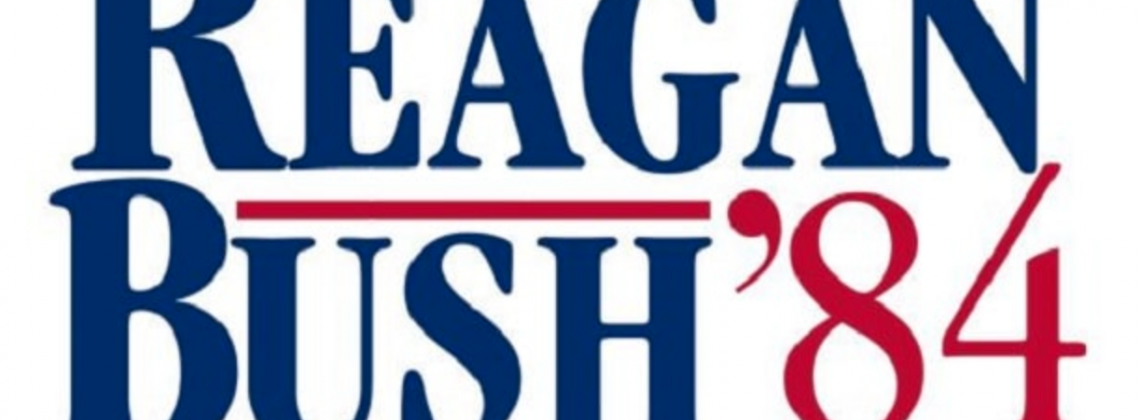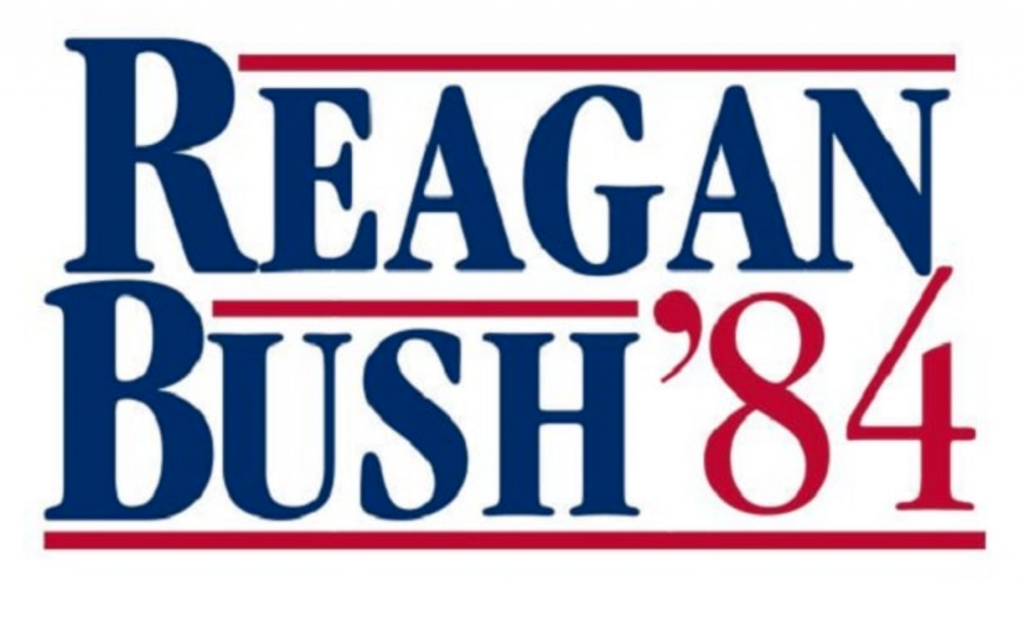

I never thought about how my new born-again faith might affect my politics. Then I went to Bible college.
On November 7, 1984, I was two-thirds of the way through the first semester of my freshman year at Philadelphia College of Bible. I was seated in the back right corner of Chatlos Chapel as the assistant to the college president—his name was Jamie—opened our required morning service with a word of prayer. He gave thanks to God because the previous day, Election Day, Ronald Reagan won a second term as president of the United States in a landslide victory over former Minnesota senator and vice-president Walter Mondale.
Students and faculty at Philadelphia College of Bible were not usually prone to emotional outbursts during chapel. After all, this was a school that taught the Holy Spirit-inspired emotional manifestations on the Day of Pentecost ceased with the age of the apostles. During chapel we usually sat attentively and listened respectfully in accordance with the staid and rational faith informed by the college’s dispensational approach to biblical interpretation. But I swear I heard someone yell “Amen” as Jamie, with what appeared to be clear insight into God’s plan for the direction of the United States, offered his prayer of gratitude. Reagan was re-elected. God’s will was done on earth as it is in heaven.
About three years earlier, on a warm July afternoon, I was seated at the kitchen table in the northern New Jersey house where I grew up. I was also praying. With all the faith I could muster I was reading a prayer of salvation I found in the back of a small devotional booklet called Our Daily Bread. That prayer changed the trajectory of my life. From this point forward I would identify as a “born-again Christian.” I was fifteen years old.
My parents prayed this prayer, or at least a similar one, months before I did. They left the church of their (and my) childhood and joined a congregation made up of other born-again Christians. Gilgal Bible Chapel was no ordinary church. It was more like an intentional Christian community run by twenty-something graduates of evangelical colleges who all lived together on a few dozen acres of land in West Milford, New Jersey. When we arrived, Gilgal was entering a stage of maturation. More and more families were joining the community and the congregation’s outreach to the greater West Milford area was growing. Gilgal welcomed our family with open arms, and for the next several years I threw myself into the life of this evangelical commune with reckless abandon. I was a regular at Wednesday night youth group, served as a leader in the junior high ministry on Friday nights, devoted my summers to working as a counselor in the church’s day camp, and spent Saturdays hammering nails as part of a Habitat for Humanity-like construction ministry that helped those in need.
During these years—roughly 1982 to 1984—I do not remember having a single discussion about politics. Our pastor did not preach political sermons. There were no Sunday School classes about politics. And people rarely discussed politics in informal settings.
I had always been a political junkie. Growing up, the greatest political influence on my life was my Italian grandfather, an immigrant who spent most of his life as a Teamster, driving delivery trucks for Newark breweries and making daily runs to Albany, New York Wilmington, Delaware, and Riverhead, Long Island. “I am a Democrat,” he used to say, “because the Democrats are the party of the working man.” Every Sunday when we would visit my grandparents’ house for dinner I would get a lesson in American political history that usually centered around the Democratic icons of my grandfather’s generation. I felt as if FDR, JFK, and LBJ were long-lost uncles. When it came to my own personal convictions, I was a Democrat. But now the whirlwind of activity at Gilgal Bible Chapel made it hard to stay abreast of the comings and goings of life in Washington D.C. Following politics was a nice hobby, but there was more important work to do—kingdom work.
This was the cultural baggage I carried with me into that chapel service in November 1984. I had never thought about how my new born-again faith might affect my politics. It was complicated enough trying to learn the books of the Bible and the language, music, and influential voices of this strange new evangelical subculture I had just entered. So needless to say, I was startled when Jamie thanked God for Reagan’s victory. I was even more surprised that his clearly political prayer did not seem to faze any of my fellow classmates—mostly kids who grew-up in the evangelical church, “asked Jesus into their hearts” when they were six-years old, and attended Christian schools during their K-12 years.
My eighteen-year-old self now began to wonder: Does God care about the winner of a presidential election? Did Gilgal forget to tell me that when I prayed that kitchen-table prayer I was not only taking-up my cross and following Jesus in a life of discipleship but was also joining a political party? As I look back on that morning, I now realize that Jamie’s prayer was the first time I actually realized that my experience at this Bible college was not only preparing me for a potential career in the Christian ministry. It was also, in an extracurricular way, trying to initiate me into a political movement—the Christian Right.
But this was only the beginning of my enculturation. For the next couple of weeks I want to use this space to reflect on what I experienced during those “born-again” years and how the 1980s shaped my understanding of faith, politics, and vocation.
John Fea is Executive Editor of Current
Around 2000 or 2002 one of my very conservative but not super-active politically students was reviewing a Christian Coalition voter’s guide she’d been given during the time prior to class, commenting on its mentions of budgets, taxes, defense spending, and gun-rights, and suddenly exclaimed with eureka-like clarity, “What does any of this have to do with following Jesus?!” That was the beginning of her political awakening.
John, given your political allies believe in no restrictions for abortions and that parents should have no say regarding children wanting to change sexes, I wonder if maybe your people are as evil as the folks you trash. Oh, yes, the Democrats also say that there should be no religious conscience permitted for Christian medical workers that don’t wish to participate in abortions. I’m curious to see your take all of this. So far, there is nothing but silence from you and your ilk.
I am a former evangelical, dispensational bible college graduate, and political junkie. Currently, I am Catholic, independent voter (though will admit I registered as a Democrat in Maryland so I would have a say in the primary elections – Democrats are great at screwing up and putting forth an unelectable candidate.) I am still very conservative and sometimes John Fea’s comments “upset” me – but most importantly I know we are brothers in Christ. But I see all that John does as a thoughtful look back to see how exactly we have gotten where we are. All the W. Bush era podcasts are great as I remember the time well. Keep up the good work.
William: Nothing but silence?
https://currentpub.com/2022/05/16/what-if-pro-choice-politicians-acknowledged-that-abortion-is-a-moral-problem/
Looking back, as stated above, and mentioned in a comment in the link above, I think it of great interest to see how we have gotten to the point that there are many on both sides that believe the other side is morally evil. I just purchased a short book from 2006 titled “Democrats for Life” by Kristen Day. Side note to you authors: I purchased this hardcover at Christianbooks Distributors for 0.25 – the graveyard for an author – one quarter for all your hard work. Being a bargain book shopper I will say the quarter books are usually issue/current events books. John Fea’s books are not a quarter! Back to the issue: Ms Day is listed on the book cover as the Executive Director of Democrats for Life and a quick search shows she remains in that position today. In my opinion, just as the current Republican party is fighting to purify itself – removing so called RINOS, so to the Democrats have purified their party from Pro-Life voices from within. I think there is one elected Pro-Life representative left on the D-side in Congress. I remember being at a Pro-Life march in 2004 and standing next to a person with a Pro-Lifer for Kerry button on her jacket. Our political life needs more if this. As opposed to the radical sorting we see and, frankly, William, I hear too much of the us against them mentality in your comment. This is the problem and John Fea pointing out such problematic speech and actions from those on the right who should know and act better – due to civility in general, and/or specifically due to Christian commitment – is needed.
That being posts about current events and policy – Posts speaking out against David Barton is just easy historical correction!
John, I was in college same time as you–studying philosophy at Wheaton. But I was 27 in the fall of ’84…my conversion came in 1975, and it took me a while to get to college. We had whiffs of the Christian right among the Jesus freaks, and a fair amount of the left and right at Wheaton. What most lacked was not a sincere desire to be faithful in shaping public policy, but remembering that the motive for that was love for neighbor–not that the kingdom of God is somehow of this world.
Yes. It was a different time. This is why I am not always onboard with those who want to stress continuity–“Evangelicals have always been political”; “evangelicals have always been Christian nationalists;” or “evangelicals have always been racist.” And etc. Thanks for sharing this.
I have come to learn that William is a very selective reader.
Thanks, C. I am conservative on a lot of things as well. We probably have more in common than you think.
Today it’s oil and gas prices and whether or not Atlanta gets the MLB All-Star game.